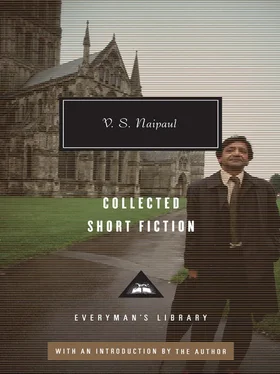He said, ‘I think you are a genius.’
When I went home I told my mother, ‘That essay I write today, I get ten out of twelve for it.’
My mother said, ‘How you so bold-face to lie brave brave so in front of my face? You want me give you a slap to turn your face?’
In the end I convinced her.
She melted at once. She sat down in the hammock and said, ‘Come and sit down by me, son.’
Just then the crazy fit came on me.
I got very angry for no reason at all and I said, ‘No, I not going to sit by you.’
She laughed and coaxed.
And the angrier she made me.
Slowly the friendliness died away. It had become a struggle between two wills. I was prepared to drown rather than dishonour myself by obeying.
‘I ask you to come and sit down here.’
‘I not sitting down.’
‘Take off your belt.’
I took it off and gave it to her. She belted me soundly, and my nose bled, but still I didn’t sit in the hammock.
At times like these I used to cry, without meaning it, ‘If my father was alive you wouldn’t be behaving like this.’
So she remained the enemy. She was someone from whom I was going to escape as soon as I grew big enough. That was, in fact, the main lure of adulthood.
Progress was sweeping through Port-of-Spain in those days. The Americans were pouring money into Trinidad and there was a lot of talk from the British about colonial development and welfare.
One of the visible signs of this progress was the disappearance of the latrines. I hated the latrines, and I used to wonder about the sort of men who came with their lorries at night and carted away the filth; and there was always the horrible fear of falling into a pit.
One of the first men to have decent lavatories built was Hat, and we made a great thing of knocking down his old latrine. All the boys and men went to give a hand. I was too small to give a hand, but I went to watch. The walls were knocked down one by one and in the end there was only one remaining.
Hat said, ‘Boys, let we try to knock this one down in one big piece.’
And they did.
The wall swayed and began to fall.
I must have gone mad in that split second, for I did a Superman act and tried to prevent the wall falling.
I just remember people shouting, ‘O God! Look out!’
I was travelling in a bus, one of the green buses of Sam’s Super Service, from Port-of-Spain to Petit Valley. The bus was full of old women in bright bandanas carrying big baskets of eddoes, yams, bananas, with here and there some chickens. Suddenly the old women all began chattering, and the chickens began squawking. My head felt as though it would split, but when I tried to shout at the old women I found I couldn’t open my mouth. I tried again, but all I heard, more distinctly now, was the constant chattering.
Water was pouring down my face.
I was flat out under a tap and there were faces above me looking down.
Somebody shouted, ‘He recover. Is all right.’
Hat said, ‘How you feeling?’
I said, trying to laugh, ‘I feeling all right.’
Mrs Bhakcu said, ‘You have any pains?’
I shook my head.
But, suddenly, my whole body began to ache. I tried to move my hand and it hurt.
I said, ‘I think I break my hand.’
But I could stand, and they made me walk into the house.
My mother came and I could see her eyes glassy and wet with tears.
Somebody, I cannot remember who, said, ‘Boy, you had your mother really worried.’
I looked at her tears, and I felt I was going to cry too. I had discovered that she could be worried and anxious for me.
I wished I were a Hindu god at that moment, with two hundred arms, so that all two hundred could be broken, just to enjoy that moment, and to see again my mother’s tears.
1955
AND BLUEY is the hero of this story.
At first Bluey belonged to the Welsh couple in the basement. We heard him throughout the house but we hardly saw him. I used to see him only when I went down to the dustbins just outside the basement window. He was smoky blue; lively, almost querulous, with unclipped wings, he made his cage seem too small.
When the Welsh couple had to go back to Wales — I think Mrs Lewis was going to have a baby — they decided to give Bluey to Mrs Cooksey, the landlady. We were surprised when she accepted. She didn’t like the Lewises. In fact, she didn’t like any of her tenants. She criticized them all to me and I suppose she criticized me to them. You couldn’t blame her: the house was just too full of tenants. Apart from a sitting-room on the ground floor, a kitchen on the landing at the top of the basement steps, and a bedroom somewhere in the basement, the whole of the Cookseys’ house had been let. The Cookseys had no children and were saving up for old age. It had come but they didn’t know.
Mrs Cooksey was delighted with Bluey. She used to lie in wait behind her half-opened door and spring out at us as we passed through the hall; but now it wasn’t to ask who had taken more than his share of the milk or who had left the bath dirty; it was to call us into her room to look at Bluey and listen to him, and to admire the improvements she had made to his cage.
The cage, when I had seen it in the basement window, was an elegant little thing with blue bars to match Bluey’s feathers, two toy trapezes, a seed-trough, a water-trough and a spring door. Now every Friday there were additions: Mrs Cooksey shopped on Friday. The first addition was a toy ferris wheel in multi-coloured plastic. The second was a seed-bell; it tinkled when Bluey pecked at it. The third was a small round mirror. Just when it seemed that these additions were going to leave little room for Bluey, Mrs Cooksey added something else. She said it was a friend for Bluey. The friend was a red-beaked chicken emerging from a neatly serrated shell, all in plastic and weighted at the bottom to stay upright.
Bluey loved his toys. He kept the chicken and shell swaying, the trapezes going, the ferris wheel spinning, the seed-bell ringing. He clucked and chattered and whistled and every now and then gave a zestful little shriek.
But he couldn’t talk. For that Mrs Cooksey blamed Mrs Lewis. ‘They’re just like children, d’you see? You’ve got to train them. But she didn’t have the time. Very delicate she was. Just a romp and a giggle all day long.’
Mrs Cooksey bought a booklet, Your Budgie , and kept it under the heavy glass ashtray on the table. She said it was full of good hints; and when she had read them, she began to train Bluey. She talked and talked to him, to get him used to her voice. Then she gave him a name: Joey. Bluey never recognized it. When I went down to pay for the milk one Saturday Mrs Cooksey told me that she was also finger-training him, getting him to come out of his cage and remain on her finger. Two or three days later she called me in to get Bluey down from the top of the curtains where he was squawking and shrieking and flapping his wings with energy. He wouldn’t come down to calls of ‘Joey!’ or to Mrs Cooksey’s cluckings or at her outstretched finger. I had a lot of trouble before I got him back into his cage.
The finger-training was dropped and the name Joey was dropped. Mrs Cooksey just called him Bluey.
Spring came. The plane tree two back-gardens away, the only tree between the backs of the houses and the back of what we were told was the largest cinema in England, became touched with green. The sun shone on some days and for an hour or two lit up our back-garden, or rather the Cookseys’ garden: tenants weren’t allowed. Mrs Cooksey put Bluey and his cage outside and sat beside him, knitting a bed-jacket. Sparrows flew about the cage; but they came to dig up Mr Cooksey’s cindery, empty flowerbeds, not to attack Bluey. And Bluey was aware of no danger. He hopped from trapeze to trapeze, spun his ferris wheel, rubbed his beak against his little mirror and cooed at his reflection. His seed-bell tinkled, the red-beaked chicken bobbed up and down. Bluey was never to be so happy again.
Читать дальше









